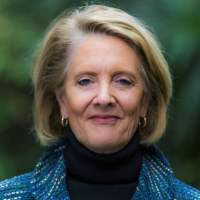Closing the Gender Gap: Empowering Women's Economic Participation
The COVID-19 pandemic has been called the biggest setback to gender equity in a decade. Women are more likely to work in the sectors hit hardest by economic closures, including healthcare, retail, and the informal economy. Women are more impacted by the burdens of caregiving—including caring for children who are now at home rather than at school. And women entrepreneurs are also often less likely than men to have access to the loans and other financial services that help businesses weather a downturn. Even before the pandemic, the World Economic Forum estimated that it would take 250 years to close the economic gender gap. How can we ensure economy recovery efforts include and support women? More broadly, how do we create a more equitable economic environment that offers the tools and opportunities women need to thrive?
Watch the video, above, or continue reading for selected quotes from our speakers.
Speaker Quotes
Blanca Treviño
“In tech, it is very frustrating because I truly believe that talent has no gender, no nationality. And we are in such a need of talent that if you, as a company, as a community, you do not want [women] to have access, you're missing 50 percent of that [talent]."
“I cannot deny that there is also this bias in many companies, in many groups—men—that will take the decision from you, and they will not offer a certain position because you’re getting married […] I don’t think they question your talent, they question if you are going to be able to make whatever is needed in order to succeed—they take the decision from you […] you might be pregnant and you’re not going to be able to do this. They think they’re giving you a favor.”
"You should never feel guilty [as a working mother] [...]. Because none of the mothers used to work, they’ll look at me or look at my daughters and ‘oh, but she works and she might not be here for them’. But at the end, they had to agree with me that I was a real mother."
“My perspective is that you need sponsors. You need people that truly believe in you and that challenge you. From my perspective, it's different than a mentor. [...] I do like sponsors that will challenge you and say ‘You want that position? Do you understand that these are the implications? Make your decisions. You do, I will support you.’”
Rebecca Tavares
“Brazil is a mirror. It is one of the most affected countries in the world right now, after the United States, by the pandemic so we see all the classic symptoms [...]. Women’s labor force participation has dropped to 1990 levels, it’s 44 percent now. Women’s unemployment now is double that of men in Brazil. The sectors that are most affected [by the pandemic] are the ones occupied by women, primarily domestic services, education, health, commerce and sales, and small businesses.”
“Brazil is ranked number 92 among 153 countries in gender equality. And this is especially disturbing because Brazil is an emerging economy, it’s one of the emerging economies in the world, it’s not a small [...] endangered economy. So, there is no reason for that to be the case.”
“Women are found to invest more in education, health, and social wellbeing, in the human capital formation of their family members and their community members. They bring the greatest return on investment. [...] This is called the gender dividend. When we invest in women, the dividend is that we have economically empowered women who invest back in their local economies and those economies prosper. Women are drivers of economic growth. In most countries, 80 percent of consumer decisions are made by women, and that is a global figure.”
“Key solutions that the private sector can take right away: Number one, mentorships, sponsorships, and coaching. [Also, the] creation of pipelines for women that show potential and girls. Companies should set goals and targets for recruitment, and that is essential. [...] The other item that is really important to emphasize, is that the leadership has to come from the very top. We can't just establish a women's or gender department or unit, or a diversity and inclusion unit, unless the very top CEO and the chair of the board are behind it and holding everyone’s feet to the fire for diversity and inclusion with targets and indicators.”
Lynn Mounzer
“The current situation of working women and women entrepreneurs in the [MENA] region is improving, surprisingly. Women are bridging gender norms, notably by taking advantage of the digital transformation […]. For example, one in three startups in the region are founded or led by women—which is technically a higher rate than in Silicon Valley. That said, the overall situation of women’s economic participation and entrepreneurship in the region is still significantly worse than other regions.”
“The existing laws and the conservative social norms create an unequal playing field for women. On top of that, we have the pay gap, we have the unequal allocation of unpaid care [and], the lack of affordable care [...]. The first will contribute to women's low economic participation. For example, [women] in the region will earn on average 78.9 percent less than men on a per capita basis. As for women entrepreneurship, the overall rate of female activity is still the lowest worldwide, with 9 percent only. Female entrepreneurs face legal, financial, cultural, and knowledge barriers. They tend to have difficulty getting loans due to discriminatory inheritance laws. So, gender stereotypes and biases, they are deeply entrenched.”
“The pandemic has made things even tougher for women workers and entrepreneurs. For one thing, the pandemic—as in any other region—has aggravated the existing restrictive social norms that reinforced the traditional family roles, and it highlighted how the discriminatory legal framework continues to deny women equal access to economic opportunities. That disproportionately affected women more than men. For example, the UN Women estimates that 700,000 women have lost their jobs in the [MENA] region. On the good side, the pandemic has helped some women entrepreneurs. For example, during my talk with women in Yemen, the growing male unemployment rate has incentivized [women] to start home-based businesses to support their families. It's something they couldn't do before due to cultural restrictions.”
Sophia Azizian
“My personal observation is that we probably over mentor women a little bit, and almost over handle them—but they’re not the problem. If you look at the university graduates, they’re mostly women. If we look at the entry levels in big corporations, there are a lot of women. In fact, my personal opinion is that they are actually better prepared when they come for interviews, and, as was also mentioned before, we actually did some studies on women entrepreneurs and we see that the pay[-back rate] on loans is much higher with women [...]. A lot of women entrepreneurs are very diligent and they are very smart, and they do really well in business. So my point would be that it’s the sponsorship of people who make decisions, that’s what is needed now; accountability for those CEOs [...]. For us to make bigger progress, we really need to bring more men on board and for them to be vocal.”
“Even in some developed countries like Germany and the Netherlands there's still a way to go. I think women are not as empowered as they probably could be. Again, it's the social norms. So, you have all the rights, but then if it's a social norm that a woman is the one who takes care of the children, if it's the woman who goes to the kindergarten picks the child at 12pm, it's not possible to combine a career with this kind of timetable.”
“The recent research in Russia and the countries of [Central Asia] is, in fact, that women are getting poorer and it’s mostly the self-employed small business—sometimes mid-size business but mostly small business—that are suffering. Quite often, if there is a discussion about layoffs it’s mostly women that are laid off. They are perceived to be easier to lay off because they are not the ones to take up the discussion [to fight back...], sometimes they might not have taken good care of signing proper contracts, or in fact, they don’t receive the income legally [...]. I also see this discriminating-type of conversation, that it is always a guy who needs to support the family, so if a woman is married, for some reason she’s perceived to be easier to lay off because she has a husband who will look after her.”
Keynote Speaker

Moderators

Senior Director, Albright Stonebridge Group


Panelists



Gender in Business Specialist
Hosted By

Mexico Institute
The Mexico Institute seeks to improve understanding, communication, and cooperation between Mexico and the United States by promoting original research, encouraging public discussion, and proposing policy options for enhancing the bilateral relationship. A binational Advisory Board, chaired by Luis Téllez and Earl Anthony Wayne, oversees the work of the Mexico Institute. Read more


Brazil Institute
The Brazil Institute—the only country-specific policy institution focused on Brazil in Washington—aims to deepen understanding of Brazil’s complex landscape and strengthen relations between Brazilian and US institutions across all sectors. Read more


Kennan Institute
After more than 50 years as a vital part of the Wilson Center legacy, the Kennan Institute has become an independent think tank. You can find the current website for the Kennan Institute at kennaninstitute.org. Please look for future announcements about partnership activities between the Wilson Center and the Kennan Institute at Wilson Center Press Room. The Wilson Center is proud of its historic connection to the Kennan Institute and looks forward to supporting its activities as an independent center of knowledge. The Kennan Institute is committed to improving American understanding of Russia, Ukraine, Central Asia, the South Caucasus, and the surrounding region through research and exchange. Read more


Latin America Program
The Wilson Center’s prestigious Latin America Program provides non-partisan expertise to a broad community of decision makers in the United States and Latin America on critical policy issues facing the Hemisphere. The Program provides insightful and actionable research for policymakers, private sector leaders, journalists, and public intellectuals in the United States and Latin America. To bridge the gap between scholarship and policy action, it fosters new inquiry, sponsors high-level public and private meetings among multiple stakeholders, and explores policy options to improve outcomes for citizens throughout the Americas. Drawing on the Wilson Center’s strength as the nation’s key non-partisan policy forum, the Program serves as a trusted source of analysis and a vital point of contact between the worlds of scholarship and action. Read more


Middle East Program
The Wilson Center’s Middle East Program serves as a crucial resource for the policymaking community and beyond, providing analyses and research that helps inform US foreign policymaking, stimulates public debate, and expands knowledge about issues in the wider Middle East and North Africa (MENA) region. Read more


